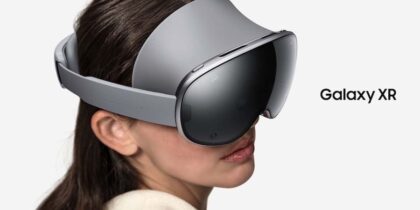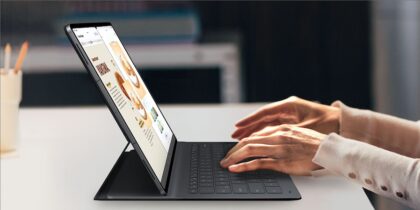In an increasingly connected and mobile world, being open is the key to success. Samsung breaks down the reasons why, and offers up insights on how businesses can leverage the Next Mobile Economy.
Since mobile phones first came into being, mobile has become the new norm for how people, companies, governments and organizations communicate — disrupting the business landscape. Our world is now a rapidly expanding, increasingly connected ecosystem of people, devices and systems. Everyday objects are already talking to each other across a vast network called the Internet of Things (IoT), one of the four key trends driving mobile transformation today, along with Augmented and Virtual Reality (AR/VR), Artificial Intelligence (AI) and high-speed 5G networks.
In fact, the Fourth Industrial Revolution, which we’re experiencing right now, is marked by the integration and combination of these technologies. Despite this evolutionary shift that shows no sign of slowing down, many are still woefully unprepared to step up to what we call the Next Mobile Economy.
Open Systems Rule the Next Mobile Economy
We are now at a tipping point that could make or break your business. New technologies and new ways of using them will disrupt and transform businesses more than ever before, and at an unprecedented speed. What once provided a competitive edge is now critical across all sectors.
Businesses that see the Next Mobile Economy as an opportunity instead of a challenge, who harness these new technologies holistically, are the ones that will thrive — and many have already started.
42 percent of the world’s leading business innovators are prioritizing mobile products and capabilities, focusing on big data analytics and integrating new technologies like VR and open systems. Which makes the chances of business success or failure in the New Economy boil down to one critical question: Are you open or closed?
Although closed systems are easy to control, they also tend to be rigid — dictating how you work, and boxing you into a less flexible ecosystem of services. They offer little opportunity for custom configuration and differentiation, making them incompatible with the march of technology across AR/VR, IoT, AI and 5G today.
Embrace the Next Mobile Economy
Discover how to identify and address the growing tech gap between C-suite and the next generation workforce in this free report. Download Now
Open systems, on the other hand, grant the kind of flexibility that you just won’t find in a closed system. They can integrate with a wide array of hardware and software, so new and emerging technologies can be easily incorporated. They adapt to innovation and collaboration, can combine data from multiple sources and allow for customization to meet the needs of owners and customers alike. Upkeep also becomes more cost-efficient, as you don’t rely on just one provider. Best of all, open systems are often updated and security-patched more quickly than closed systems, because so many different partners work collaboratively to solve issues that arise.
4 Ways to Leverage the Next Mobile Economy
Samsung’s philosophy towards the Next Mobile Economy is based on four pillars of openness: Open yet Secure, Open yet Controlled, Open Customization and Open Collaboration.
Open systems can be as secure, if not even more secure, than closed ones, as they are constantly being improved upon. They can adapt and evolve more quickly, making updating and responding to threats quicker. An all-in-one security solution like Samsung Knox allows for Open yet Secure mobile hyper-connectivity, freeing your workforce from their desks as well as outdated workplace tech, and enabling them to work on-the-go safely.
Control goes hand in hand with security. To ensure your workforce can work, research, manage and share data freely, IT managers need to easily control and update any device, from smartphones to an IoT sensor in a piece of equipment — and do so remotely. New generation Enterprise Mobility Management systems like Knox Manage allow for Open yet Controlled management, where parameters can be set to decide how, where and when a device can be used, and what applications can be loaded.
But keeping up with the Next Mobile Economy isn’t always about building a new solution. Besides, you may not always be able to afford it. With Open Customization, you can take an affordable, off-the-shelf device and tailor it with Knox Configure in almost limitless ways. Alternatively, you can spend a lot of money and effort leveraging the knowledge, manufacturing power and R&D of your tech partners to build custom hardware.
It’s a fact that no single company can provide every single solution to everyone. That’s why it comes down to choosing the right partners for Open Collaboration. By identifying the ways in which you can add more value to your customers, you can then consider the technology partners who can best help you achieve that reality. At Samsung, we also work with our customers to solve real world business problems, letting them guide us on what to build and where to make our next investments.
So while security and control have never been more important, great care has to be taken to configure your infrastructure in a way that fosters collaboration, rather than impedes it.
In a world that’s increasingly connected, mobile, nimble and infused with new technologies, being open can only be a good thing. It will enable businesses to become more agile and creative, boost the flow of information, and unlock opportunities for businesses to reach their collaborative potential. This will in turn help you get the most out of your workforce, increase customer satisfaction, and help future-proof your business for the Next Mobile Economy.
For more insights on transforming your organization, click here to watch our webinar, Thriving in the Next Mobile Economy: How Being Open Is the Future of Your Business.









